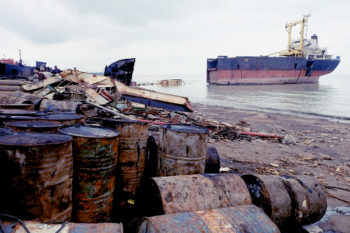
Some 124 ships out of 227 ships broken in the third quarter of 2017 ended up on beaches in South Asia for dirty and dangerous breaking, the latest report from NGO Shipbreaking Platform shows.
A total of 42 ships were sent for demolition to Turkey, 35 to China, and 26 were scrapped in the rest of the world.
Shipowners continue to sell their tonnage to infamous beaching yards in South Asia as it brings in more money. As explained by the Platform, there is little or no investments in proper infrastructure to contain pollutants and ensure safe working conditions, the proper disposal of hazardous wastes is overlooked, and migrant workers are exploited.
Moreover, the prices offered for ships this third quarter have been high in South Asia, especially when compared to the figures of the first half of the year. Monsoon rains caused a shortage of local product being available to the domestic steel mills and have, therefore, driven prices for end-of-life ships up, the report said.
Whilst a South Asian beaching yard can pay about USD 400/LDT, Turkish yards are currently paying slightly less than the USD 250/LDT offered by Chinese yards.
NGO Shipbreaking Platform said that Greek shipowners have sold the most ships to the beaching yards with 11 beached vessels this quarter, followed by South Korea and Singapore with 6 vessels each. Shipping companies from the United States sold 5 vessels.
“Singaporean Continental Shipping Line remains the worst corporate dumper, though it currently shares this position with the Greek Anangel Shipping Enterprises and the Iranian Iran Shipping Lines. In total, these companies had three vessels each beached in South Asia in this quarter,” the Platform added.
According to the report, Bermuda-based Berge Bulk, Greek Costamare, Swedish Holy House Shipping, and American SEACOR are close runner-ups, with two ships each sold for beaching.
Brazilian-owned product tanker LOBATO, which was reportedly sold by Petrobras to Indian breakers, ended up on the shores of Chittagong instead. No tanker was sold to the Gadani yards in Pakistan following the ban on tankers due to the major explosion on the ship ACES on the 1st of November of last year.
Although 33 out of the 124 beached vessels this quarter were European-controlled, only three of these had a European flag when they arrived in South Asia. All ships sold to the beaching yards pass via the hands of scrap-dealers, also known as cash-buyers, that often re-register and re-flag the vessel on its last voyage.
Almost half of the ships sold to South Asia this quarter changed flag to the grey- and black-listed registries of Comoros, Niue, Palau, St. Kitts & Nevis, and Togo just weeks before hitting the beach.
Between July and September, one worker lost his life at a shipbreaking yard in Alang, India. Another worker was reported seriously injured in Chittagong, Bangladesh, the report finds.
Namely, in September, a worker named Ashok Yadav, was reported killed whilst at work at shipbreaking plot no. 14 in Alang, India. Following his death, a letter denouncing the unsafe working conditions at the shipbreaking yards in Alang was sent to Indian Government officials by Toxics Watch Alliance.
Around the same time, Md. Shohag – 21 years old – was hurt while torch-cutting a vessel at Zuma Enterprise in Chittagong, Bangladesh, when an iron plate hit him on the left foot and stomach, causing severe injury, the data from the report indicates.
Copyright Ships & Ports Ltd. Permission to use quotations from this article is granted subject to appropriate credit given to www.shipsandports.com.ng as the source.